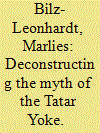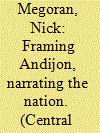| Srl | Item |
| 1 |
ID:
083597


|
|
|
|
|
| Publication |
2008.
|
| Summary/Abstract |
Analysing and comparing the various conventional and revisionist narratives on what is known as the 'Tatar Yoke', this article aims to show that Western historiography has long been critical of the dominant negative view on the Tatar-Mongol rule over Russian principalities and that in Russia we find similar revisions in history - with some exceptions - only in post-Soviet times. This article aims to demonstrate how the revisionist views on the Tatar-Mongol rule contributed to the political and cultural transformation of contemporary Russia. In the part which analyses the revisionist discourse in Russia the emphasis lies on the new Tatar narrative. For Tatars the new interpretation of the Tatar-Mongol rule is of outstanding importance because it functions as a means to enhance Tatar national pride, and it contributes to Tatarstan's sovereignty project.
|
|
|
|
|
|
|
|
|
|
|
|
|
|
|
|
| 2 |
ID:
083598


|
|
|
|
|
| Publication |
2008.
|
| Summary/Abstract |
This article covers the period from the Islamic Revolution to Khatami's landslide victory at the presidential elections in 1997 and analyses the processes leading to the formation of a national movement in Iranian Azerbaijan. It successively explores the role played by the Turkish intellectual entrepreneurs, former Leftists and disillusioned Islamists in politicizing Azerbaijani identity and shaping a nationalist movement. This process of aggregation of different social groups reveal what has now become one of the main symptoms of the profound crisis faced by the Islamic Republic
|
|
|
|
|
|
|
|
|
|
|
|
|
|
|
|
| 3 |
ID:
083596


|
|
|
|
|
| Publication |
2008.
|
| Summary/Abstract |
Tashkent's handling of anti-government protests and violence in the city of Andijon on 13 May 2005 has generated enormous controversy and had significant political repercussions. However, there has been no detailed analysis of rival interpretations of what happened. This paper begins to redress this lacuna by analysing a book on the subject authored by the President of Uzbekistan, Islam Karimov. Using framing theory, it identifies four key themes deployed in the narrative to delegitimize the government's opponents: terrorism and criminality; inauthentic Uzbekness and deviant masculinity/religiosity; constitutional illegitimacy; and the subversion of the scientific laws of states. Significantly for an understanding of regime legitimization and nationalism in Uzbekistan, no recourse is made to the government's intellectual framework known as the 'ideology of national independence'. The paper points to the need for further research to enable scholars to develop a deeper and more nuanced understanding of the contemporary politicization of national belonging in independent Uzbekistan
|
|
|
|
|
|
|
|
|
|
|
|
|
|
|
|
| 4 |
ID:
083595


|
|
|
|
|
| Publication |
2008.
|
| Summary/Abstract |
Examining the politics of local-level extraction in Uzbekistan, this article identifies the emergence of two rent-seeking strategies among local prokurators. Using case study material from Samarkand Province and Navoii Province, it demonstrates how concentrated economic resources under rural elites and dense patronage ties to regional politicians determine the limits placed on rent seeking. As this analysis seeks to emphasize, state capabilities within Uzbekistan's territorial infrastructure, and their effects on extraction, are multi-faceted, highly fluid, and intimately local
|
|
|
|
|
|
|
|
|
|
|
|
|
|
|
|
| 5 |
ID:
083599


|
|
|
|
|
| Publication |
2008.
|
| Summary/Abstract |
The article focuses on the study of the Ism'?l? saints (awliy) andshrines (qadamgh) in the Wakhan region of Tajikistan along with their historical context. Its essential purpose is to draw a succinct historical and ethnographic picture of shrine culture in the region and determine its religious significance in the broad frame of socio-cultural context of Wakhan. While discussing rituals associated with saint veneration and shrine visitation, it elaborates on the changing role of shrine culture in modern Wakhan and its adaptation to the newly established social and cultural circumstances after the collapse of the Soviet Union. It is argued that the process of religious and cultural revival in post-Soviet Wakhan had its own distinctive element manifested in the transformation of the existing shrines into museums or 'museumization' of shrines, a process that not only changed the spatial compositions of the shrines but also enhanced their social and cultural functions.
|
|
|
|
|
|
|
|
|
|
|
|
|
|
|
|
| 6 |
ID:
083600


|
|
|
|
|
| Publication |
2008.
|
| Summary/Abstract |
In the late 1980s, the Soviet Union was the world's largest hydrocarbon producer. The landmass over which these resources are distributed is vast and the reserves mostly landlocked. To convey these hydrocarbons to refineries and to market, the Soviets constructed the largest integrated pipeline networks in the world. After the dissolution of the Soviet Union, new competing national interests have produced tensions over these energy resources and transmission corridors, with economically detrimental and often irrational consequences. In Central Asia, the post-Soviet Republics of Turkmenistan, Kazakhstan and Uzbekistan produce significant amounts of hydrocarbons and export their oil and gas to or through Russian Federation territory. Russian government policy aims to continue exercising political control over these resources and to maximize Moscow's share of profits from their export. This paper examines oil and gas transmission issues in Central Asia, against a backdrop of emerging new relationships between the Russian Federation and the three post-Soviet republics, the resurgent strategic competition between Russia and the United States, China's developing power base in the region and Iran's potentially key geographic position for channelling Caspian energy supplies towards the Persian Gulf.
|
|
|
|
|
|
|
|
|
|
|
|
|
|
|
|